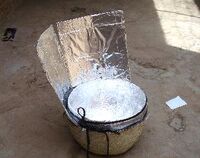Tom Sponheim (talk | contribs) m (→Contributions) |
Tom Sponheim (talk | contribs) |
||
| Line 37: | Line 37: | ||
E-mail: [Stephensheila_1@msn.com Stephensheila_1@msn.com]<br> |
E-mail: [Stephensheila_1@msn.com Stephensheila_1@msn.com]<br> |
||
http://www.darfurpeaceanddevelopment.org<br> |
http://www.darfurpeaceanddevelopment.org<br> |
||
| − | Phone: (260)418-6699 |
+ | Phone: (260) 418-6699 |
==Contributions== |
==Contributions== |
||
Revision as of 23:44, 23 April 2007
The simple task of cooking a meal in Darfur brings with it a unique series of problem and risks. The majority of Darfurians are now displaced in IDP (Internally Displaced People) camps. Wood is getting increasingly scarce and as each family consumes this limited energy source the deforestation of Darfur advances. Augmenting this is the danger to those who do go out and gather firewood. If caught by the Janjaweed the men are killed and the women are raped. Literally thousands of hours are expended on foraging for wood in each IDP camp. This time could be better put to use doing a variety of other things to develop the lives of the people. Solar cooking offers a simple way to alleviate some of these problems.
Description of Project
The principle behind solar cooking is simply that of converting solar light rays into heat. Over the past 20 years solar cooking has become simple for the average person to use. Now it has become a tool that can be utilized by the IDPs and refugees around the world. Although there many successful designs of solar cookers the one that fits best to the needs of refugees with limited resources is called the Cookit from Solar Cookers International (SCI). It combines the best of several designs into a simple portable style that has been successful in numerous refugee camps in Africa.
Benefits for Darfur
- Long term, it reduces the consumption of firewood by at least a third and therefore significantly slows deforestation.
- It saves many hours of time from searching for firewood, hauling it home and splitting it, therefore leaving more time for other needs of life. It also saves time while cooking because it does not have to be closely watched since it does not burn the food.
- It reduces the risk of the women and girls getting raped and the men killed while out foraging for wood.
- It will eventually provide some employment for the refugees who produce the cookers in the camps or in the surrounding area especially if utilizing local materials.
How it Works
The solar Cookit is made of cardboard or other local material and is cut into a specific shape that will effectively reflect the solar light rays toward a black metal pot of food. This pot, when painted black on the outside, absorbs and retains the heat from the solar rays . A clear polypropylene bag tied around the pot creates an insulating barrier of air and allows the pot to easily reach 250 degrees F. (about 121 C), which is more than enough to cook several liters of food in a few hours. Each bag can be reused for a month or more.
Cost Factor for the Solar Cooker
This design of solar cooker has been mass-produced in many countries such as Uganda, Kenya, Zimbabwe, Turkey, the United States and Mexico. Depending on the local costs of aluminum foil and cardboard, costs to make a Cookit and provide cooking bags range about $5.00 for each family.
Implementation in Darfur
Changing habits of cooking and diet come very slowly to many people. The education process to make this project a success in Darfur will take the bulk of time and finances. It is better to be successful with a few who continue using solar cookers than have a big campaign and have the concept fizzle in a few months. A plan of 3-5 years need to be followed to make sure the people of a region are actively using solar cookers and are drawing the more marginal people into the mainstream of this project. Investing time, energy, and funding in training others is where the success of this venture lies. It addition to teaching the women of Darfur how to use solar cookers it should also be introduced into the local schools. The children of Darfur can begin to start learning practical ways to use their natural resources and begin working together to stop the deforestation of their land. Each child is a natural bridge into each home where these kinds of ideas can be encouraged for a future hope for Darfur.

Example of a prototype cooker in Darfur using a locally made water pot in a basket to cook rice and breads
Welcome new Innovation
In time there are other styles of solar cookers that could be made using local materials. We need to draw on the creative minds of the local population to adapt other things to be used for solar cookers rather than just cardboard. However the crisis at hand in Darfur dictates a quick affordable solution that the Cookit offers.
For more information
Please contact:
Stephen Harrigan
Darfur Solar Cookers Project Coordinator
E-mail: [Stephensheila_1@msn.com Stephensheila_1@msn.com]
http://www.darfurpeaceanddevelopment.org
Phone: (260) 418-6699
Contributions
Tax deductible donations for the Solar Cooker Project may be sent to the following address. Be sure to write "Solar Cooker Project" in the memo line.
Darfur Peace and Development Organization
c/o Suliman Giddo
P.O. Box 5743
Fort Wayne, IN 46895
USA
[Text for this page was adapted from http://www.darfurpeaceanddevelopment.org]
